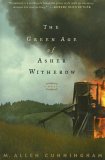Book Club Discussion Questions
In a book club? Subscribe to our Book Club Newsletter and get our best book club books of 2025!
For supplemental discussion material see our Beyond the Book article, and our BookBrowse Review of The Green Age of Asher Witherow.
Please be aware that this discussion guide will contain spoilers!
- Setting is so central to The Green Age of Asher Witherow that it
almost becomes a character. Why is the natural landscape of the Diablo Valley so
important, especially to the younger characters in the novel?
- Several myths, legends and systems of belief are mentioned in the novel.
There is the traditional Protestant Christianity of Reverend Parry and the
Nortonville residents; there is Josiah Lyte's own unique version of
Christianity; there is the Hinduism that influences him during his childhood in
India; there are the Native American legends of Indian tribes that first named
the mountain and the Celtic myths and stories of Asher's Welsh ancestors. Do
these "underpinnings" make the events of the story clearer or more
puzzling to you?
- Sarah Norton is a disturbing character in the novel. As a midwife (and, in
Anna's case, an abortionist), she is suspected by some people in Nortonville of
being a witch. She lives alone, apart from her husband, and her solitary
activities include gathering Indian artifacts and planting a new cottonwood tree
for each child she delivers. Why do you think the author "drew" her
this way?
- The coal miners of Nortonville are a proud people. What seems to be the
nature of that pride, and what are its main sources?
- Asher's mother, Abicca, is among the many citizens of Nortonville who
believe the young minister, Josiah Lyte, is ungodly and dangerous (though her
repeated attempts to keep Asher away from him fail). But in his conversations
with Asher, Lyte doesn't seem so much dangerous as different. In your
opinion, does Josiah Lyte pose a real threat to the town?
- Why is Josiah Lyte so interested in Asher? Is it simply because the boy is
a gifted student, or is there more to it than that? When Asher tells Lyte that
he killed Thomas Motion, why does Lyte refuse to tell anyone?
- Thomas Motion teaches Asher to see in the dark. It is an ability that
Asher must struggle to learn. This ability abandons both Asher and Thomas once
they are underground (which leads to Thomas's death). Why can't they see in the
dark there? Later, Asher discovers that Anna Flood can also see in the dark. Why
do you think she already has this gift?
- What draws Asher to Anna Flood? Why is Anna so certain from the start that
they will be friends? How do the events of the story cause their relationship to
develop and change?
- The Green Age of Asher Witherow is a historical novel, with many
realistic details of nineteenth-century California and the mining town of
Nortonville. Yet certain elements of the story are more magical than real: the
young characters' ability to see in the dark; the flowers Asher sees sprouting
from frozen ground at several funerals; the mysterious characters of Josiah Lyte
and Sarah Norton. Why do you think the author chose to include these elements of
magic and mystery?
- The elder Asher gives us hints about how his life proceeded between the
time Nortonville's mining industry declined and he left the town until the
present time (1950) when he is writing his story. What do you imagine may have
happened to him in the years in between? What do you think has driven him to
write the story of his early years in Nortonville?
Suggested Reading
D.H. Lawrence, Sons and Lovers
Richard Llewellyn, How Green Was My Valley
Tawni O'Dell, Coal Run
John Steinbeck, East of Eden
William Faulkner, Light in August
Charles Frazier, Cold Mountain
Donald Harington, With
Toni Morrison, Song of Solomon
Kiki Delancey, Coal Miners' Holiday
Russell Freedman, Kids at Work: Lewis Hine and the Crusade Against Child
Labor
Barbara Freese, Coal: A Human History
Unless otherwise stated, this discussion guide is reprinted with the permission of Unbridled Books.
Any page references refer to a USA edition of the book, usually the trade paperback version, and may vary in other editions.
